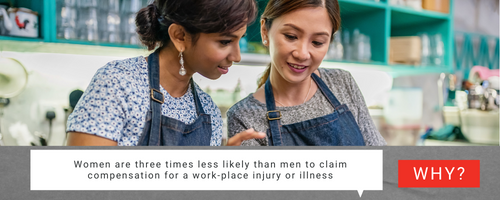Women failing to claim compensation for accidents
Women are less likely than men to claim compensation for a work-related injury or illness. Revealing a gender gap for workplace injuries.
Data analysis from The Association of Personal Injury Lawyers (APIL) shows only 3% of women claim compensation for a work-related injury.
Although this number is low, women represent more than half of work-related injury and illness victims.
GENDER GAP
APIL says: “Over the past three years, an average of 474,000 women per annum suffered a work-related injury which resulted in over seven days of absence or became ill because of their work, compared to 403,000 men.
“Despite the higher number of women becoming ill or being injured, the number of employer liability claims made by women is far fewer than the number made by men. In the past three years, while men made an average of 37,000 employer liability claims per annum, women made just 14,000.
“The reasons for this ‘gender justice gap’ are unclear. One possible explanation is that research examining the link between workplace environments and illness has traditionally focused on male-dominated industries, rather than female ones. Without research which links their illness to their working environment, women will find it more difficult to hold those responsible for their condition to account.”
REASONS FOR THE GENDER GAP
It’s a fact that women are failing to claim compensation for their workplace injuries.
We would like to see more research on the subject. Showing the reasons why women are not claiming.
Possible reasons could be:
Workplace choices: Women are more likely to work in industries with lower pay and fewer benefits. They may be in careers such as care providers or hospitality. Where women may feel reluctant to take time off work for injury or illness.
Gender-based discrimination: Women may face discrimination in the workplace. This could discourage them from reporting injuries or illnesses. Employers may insinuate their injuries are not serious. Or discriminate against them for taking time off work to recover.
Caregivers: Women are more likely than men to have caregiving responsibilities. Looking after children, elderly relatives, or other family members. This can make it more difficult for them to take time off work to seek medical treatment or to begin a compensation claim.
Lack of information: Women may be less aware of their rights to compensation or how to access the system. They may also face language barriers. Or other problems that prevent them from understanding the process.
HOW TO CLOSE THE GENDER GAP
Addressing these barriers will need an all-around approach. It must include better access to information and legal protection against discrimination.
We need greater awareness of the needs and challenges faced by women in the workplace.
Knowledge is key. Anyone involved in an accident that was not their fault should seek legal advice.
Some people are reluctant to begin a claim for fear of upsetting an employer. Or ruining their career.
Employers have a duty of care to protect their employees. Employer’s Liability Insurance is compulsory. Employers should have it by law and it covers accidents in the workplace.
Regardless of gender, your employer must treat you fairly.
You have every right to claim compensation. For any injury or financial loss incurred as a result.
NV LEGAL
If you have been injured or taken ill at work, contact us for free legal advice.
NV Legal has a specialist team of solicitors who are experts in relation to accident at work cases. If you or someone you know has questions about these issues, contact us for free legal advice.
Advice is from qualified solicitors, regulated by the Solicitors Regulation Authority.
Call – 03308 281 586
Email – info@nvlegal.co.uk
Website – www.nvlegal.co.uk
Find us on social media – Facebook LinkedIn
USEFUL LINKS
Involved in an accident at work? We explain your rights and how to claim for personal injury


